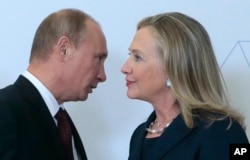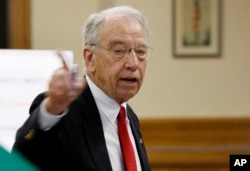U.S. Attorney General Jeff Sessions has instructed federal prosecutors “evaluate certain issues” regarding the Obama administration-era approval of a deal that eventually saw Russia take control of a large share of U.S. uranium reserves.
The Justice Department sent a letter to a number of Republican lawmakers detailing the move, though Sessions, during a House hearing Tuesday, said he currently sees no reason to appoint a special counsel to investigate the deal.
What was the Uranium One deal?
In 2010, the Russian atomic energy agency, known as Rosatom, took majority control of a Canadian uranium mining company called Uranium One, which had uranium mining stakes in the U.S.
Since uranium is considered by the U.S. government to be a strategic asset with national security implications, the deal required approval from multiple government agencies. Among those agencies is the State Department, which at the time, was headed by Hillary Clinton.
The sale was approved by the group of nine agencies, known as the Committee on Foreign Investment in the United States (CFIUS) and, through the deal, Russia gained control of about 20 percent of the U.S. uranium production capacity.
The deal allowed Rosatom to become one of the largest uranium producers in the world and, in turn, allowed Russian President Vladimir Putin to secure a higher standing among major atomic energy players.
While Clinton’s State Department signed off on the deal, she has said she was not “personally involved” in the decision.
In 2013, Rosatom took 100 percent control of Uranium One and took the company private.
What is the scandal?
According to a 2015 report from The New York Times, in the years leading up to the deal's completion, a number of people tied to Uranium One made millions of dollars’ worth of donations to the Clinton Foundation, a non-profit group run by Bill and Hillary Clinton.
Clinton did not publicly report the $2.35 million donated to the foundation by Uranium One’s chairman and others tied to the company, which she was obligated to do under an agreement she signed with the White House to disclose all donors during her tenure as secretary of state.
In addition to the donations made to the Clinton Foundation, Bill Clinton, in June 2010, the same month the Rosatom deal went through, was paid $500,000 to speak in Moscow by a Russian investment bank with ties to the Kremlin. The timing of the payment raised suspicions because it came shortly after the acquisition was announced.
According to a report last month from The Hill newspaper, the Federal Bureau of Investigation produced evidence as early as 2009 showing Russians had used bribery, extortion and other illegal measures to secure a stake in the U.S. atomic energy industry through Tenex, a subsidiary of Rosatom.
Despite this evidence, the Obama administration allowed the deal to continue and the Justice Department spent four more years investigating the corruption until 2015, when Tenex Director Vadim Mikerin was sentenced to four years in prison on money laundering charges.
Last month, the Justice Department lifted an Obama-era gag order on an FBI informant who had first-hand knowledge of the Uranium One deal, which will allow the informant to speak with congressional investigators.
The informant’s attorney, Victoria Toensing, told Fox Business Network last month the informant can “tell what all the Russians were talking about during the time that all these bribery payments were made.”
She said her client had previously been prevented from testifying due to a non-disclosure agreement he signed with Obama administration officials.
Congressional probes
Three House committees are investigating the deal.
Last month, Judiciary Committee Chairman Chuck Grassley opened an investigation into whether there were any “conflicts of interest” in the way Clinton and the Obama administration handled the deal. Grassley, on Twitter, called for the Justice Department to appoint a special prosecutor to investigate the deal.
The House Oversight Committee will team-up with the intelligence committee to determine whether the Obama administration properly responded to the FBI investigation.
President Donald Trump has repeatedly accused members of the press of ignoring the uranium deal and publicly pondered about the House investigations.








